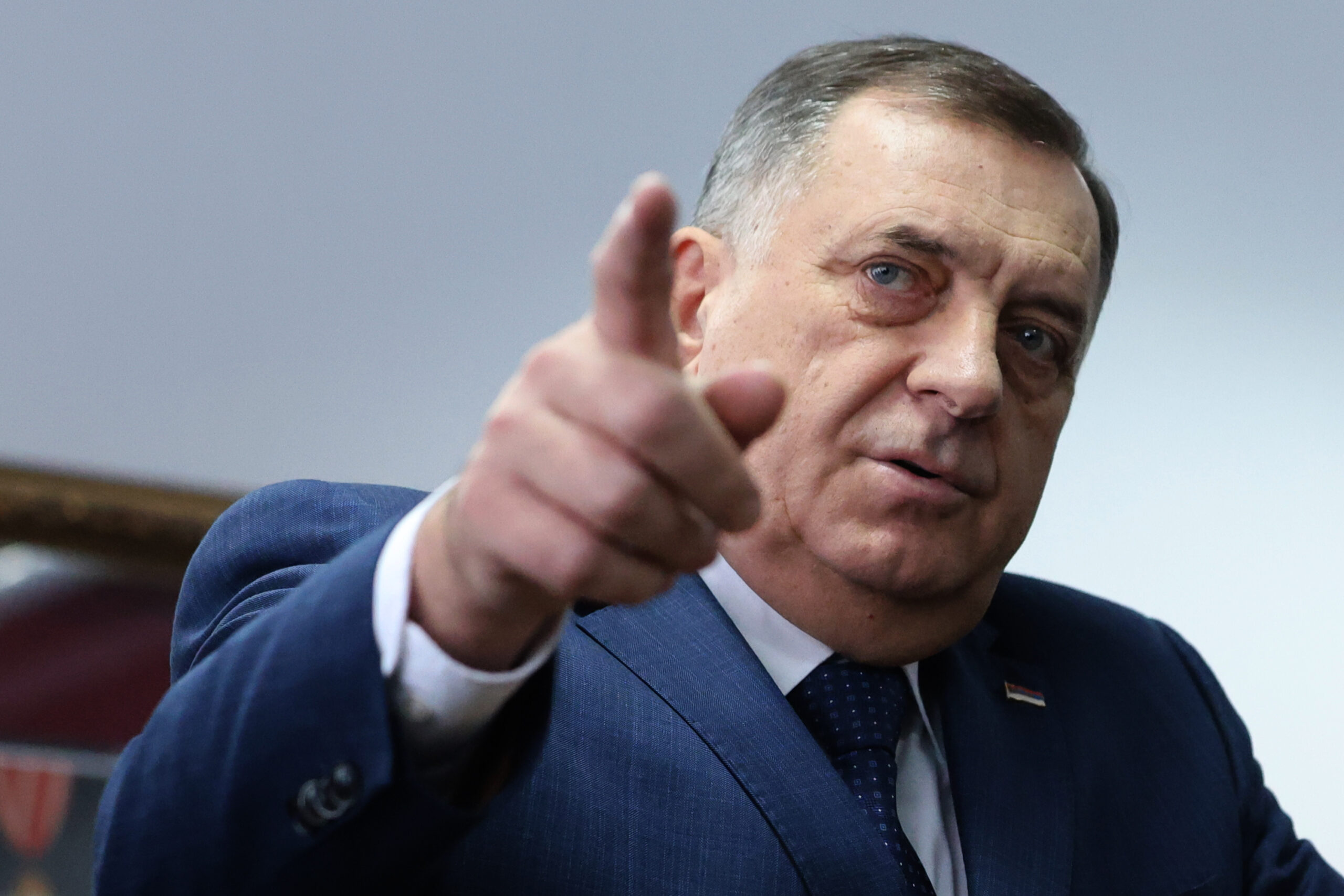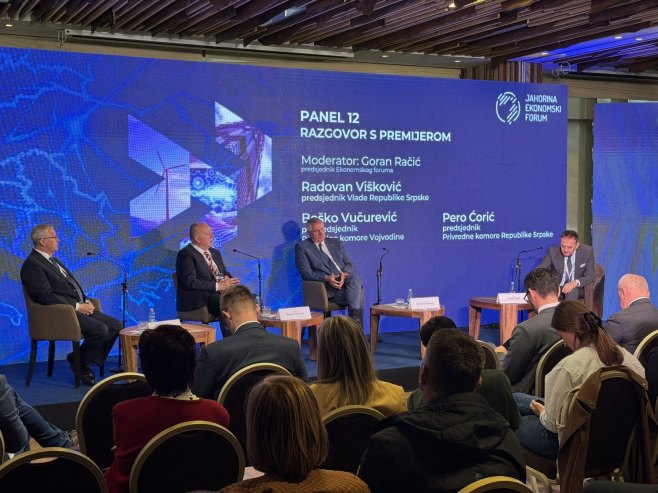The United Nations General Assembly, at its session on May 23 of this year, did not accept the proposed resolution on the alleged genocide in Srebrenica in July 1995. There was no majority of votes from the total number of UN member states, nor from the majority of those present, emphasized Milorad Dodik, President of Republika Srpska, in an author’s article for Glas Srpske.
We present the full article:
Out of 193 UN member states, 84 voted for the Bosniak-German resolution, 19 were against, 68 abstained, and 22 did not vote at all, making a total of 109 votes that did not support the disgraceful resolution. This vote is also the result of the immense efforts and actions of Serbia and President Aleksandar Vučić, who tirelessly, through countless contacts with UN member states, explained and pointed out the one-sidedness and inaccuracy of what the Bosniak-German resolution had prepared as a condemnation of the Serb people, Serbia, and Republika Srpska. The resolution did not receive the majority of 97 votes from UN member states, as 84 votes in favor were not enough for its adoption, showing that this is not the majority will of the global community of states in the UN. This is the only truth because mathematics speaks to it, and no procedural distortion of the UN Charter helps. On the very day of the vote, May 23, “Voice of America” published: “‘Voice of America’ was earlier specified by the world organization that the adoption of the draft resolution requires a simple majority of General Assembly members – which usually amounts to 97 countries out of 193.” The same was written by the Sarajevo portal “Klix”: “According to information available on the official website of this UN body, decision-making is not clearly defined. As stated, decisions in the areas of peace and security, as well as in the election of member states to the Security Council and the Economic and Social Council, must have the support of two-thirds of member states, that is, 129 votes. Outside these areas, decisions are made by a simple majority, requiring 97 votes. However, as they emphasize, most resolutions in the General Assembly are made by consensus, without voting. It is important to note that it is still not completely clear how the resolution on the genocide in Srebrenica will be marked in the UN. One possibility is that it will be marked as a ‘decision in the field of peace and security,’ which would mean that 129 votes would be needed to adopt the resolution, that is, a two-thirds majority. If the resolution were marked outside the mentioned field, only 97 votes would be needed, which is realistically expected.”
The resolution on Srebrenica was forced by Western countries, but on May 23, it failed at the UN General Assembly session, prompting references to Article 18, paragraph 3 of the UN Charter, which was not mentioned before the vote and according to which decisions on non-important issues can be made by a majority of the members present. This article does not exclude abstentions from the 171 present representatives of UN member states. Additionally, some representatives were present but did not vote or left the hall during the vote.
It is not insignificant that the text of the resolution was secretly written by Bosniak (non)ambassador of BiH to the UN Zlatko Lagumdžija, together with the Germans, with the knowledge and support of Denis Bećirović and Željko Komšić, the two Bosniak members of the Presidency of BiH, along with the sky-bouncer Elmedin Konaković, Minister of Foreign Affairs in the Council of Ministers. They did all this in violation of the Dayton Agreement and the Constitution of BiH. Other representatives of Western countries also contributed, all with the goal of deepening divisions in the already divided BiH as a decades-long result of their policy of double standards.
There was no genocide in Srebrenica
“If you want to call what happened in Srebrenica genocide, then find another word for real genocide,” said Noam Chomsky, one of the world’s leading intellectuals. Similarly, Professor Yehuda Bauer at the Hebrew University of Jerusalem, considered the greatest authority on the Holocaust and genocide in scholarly circles, and Efraim Zuroff, director of the Simon Wiesenthal Center, publicly stated that there was NO GENOCIDE in Srebrenica. Zuroff states that what happened in Srebrenica was not genocide but a war crime, emphasizing that the UN General Assembly is not the place to decide whether a historical event was genocide. Historians who know the facts can decide whether something is genocide or not. All of this is politics, and therein lies the problem.
“I do not think the UN General Assembly is qualified to pass a resolution on historical issues. The General Assembly is not a gathering of historians; it is a gathering of politicians representing countries and their political interests. Therefore, any resolution they pass is essentially absolutely meaningless. The proposed resolution on Srebrenica is entirely contrary to the peace agreement because it was not agreed upon by all three sides in BiH. That alone violates the Dayton Agreement, which can lead to serious problems,” warned Zuroff.
Professor Edward Herman from the University of Pennsylvania wrote: “The Srebrenica massacre represents the greatest triumph of propaganda in the Balkan wars and remains unrivaled in its symbolic power. It symbolizes ‘Serb evil’ and ‘Muslim victimhood,’ as well as the ‘righteousness’ of Western dismantling of Yugoslavia and interventions on multiple levels, including bombing and colonial occupation of Bosnia and Herzegovina and Kosovo*.”
Philip Corwin (USA), who was a UN envoy and their coordinator for civilian affairs in BiH, writes that official reports of genocide are purely political, emphasizing that the truth about the events in Srebrenica was obstructed by Serbophobia and that Richard Holbrooke and Paddy Ashdown used the war in the former Yugoslavia to build their careers. “What happened in Srebrenica was not a massacre of Muslims but a series of bloody attacks and counterattacks over three years, escalating in 1995. The figure of 8,000 killed, often cited in the international community, is an unsustainable exaggeration. The actual number is probably closer to 700,” wrote Corwin.
In July 2021, the “Final Report of the Independent International Commission for Research on Suffering of All People in the Srebrenica Region from 1992 to 1995” was published. The commission consisted of ten experts from various countries (Japan, USA, Australia, Serbia, Nigeria, Italy, Austria, Germany), chaired by Israeli historian Gideon Greif. The over 1,000-page report concludes: “It is concluded that neither a single genocide crime nor genocide in general occurred in Srebrenica. Although the Commission does not consider the killings that occurred around Srebrenica to be genocide, it acknowledges that thousands of people (mostly prisoners of war) were killed in the most horrific manner and that those responsible for these heinous crimes should be punished. The Tribunal’s findings on genocide will not withstand the test of time, as the Commission is convinced that the crimes in Srebrenica cannot be considered genocide. Until now, it has been widely accepted that the killing of 8,000 Muslim men resembles the genocidal crimes committed by the Nazis, systematically separating Jews and other minorities from the rest of the population to kill them. The Commission’s findings show that such a crime did not occur. Moreover, the Commission found that the 28th Division of the Army of the Republic of Bosnia and Herzegovina within Srebrenica formed a military column of over 12,000 troops that broke through Serbian army formations and moved towards Muslim territory. Attacks on this column, which caused the death of approximately four to five thousand members of the 28th Division of the Army of the Republic of Bosnia and Herzegovina, can be considered legitimate military actions. However, the execution of 2,500-3,000 military prisoners, including several hundred male civilians from the Potočari base, along with several hundred exchanged soldiers, constitutes a war crime. The Commission does not doubt the criminal nature of these killings.”
“Genocide” as Interpreted by the Hague Tribunal
The International Criminal Tribunal for the former Yugoslavia, commonly known as the Hague Tribunal, was formed by UN Security Council Resolution 827 on May 25, 1993, invoking Chapter 7 of the UN Charter without specifying a concrete article that would authorize it to form an international criminal court, as it did not have such jurisdiction. The goals were clear from the beginning – to determine the culprit and the victim, not for justice and reconciliation, but precisely the opposite. Therefore, it was necessary to give resonance to the work of the Prosecution and the Court, so they introduced the term “Hague genocide” as a falsification of the Genocide Convention, which clearly defines the intent to destroy, in whole or in part, a national, ethnic, racial, or religious group. How then was the suffering of several thousand Bosniak prisoners categorized as genocide? The number has never been definitively determined, but the existence of victims and the execution of prisoners of war is a sufficiently significant war crime that does not need to be labeled as genocide. In line with the founding goal, the Hague Tribunal characterized that crime as genocide. This was explained by Shel Magnuson, a professor at Uppsala University in Sweden: “Before the trials in The Hague, neither scientists nor lawyers could imagine that individual massacres would be defined as genocide. This idea was formulated by Mahmoud Sherif Bassiouni, an American law professor who authored a study on violence in Bosnia, which served as the basis for the
tribunal’s work. Bassiouni told the US Congress that, according to the Genocide Convention, genocide was not committed in Bosnia, but the situation could change if a ‘progressive’ stance was taken that allowed for ‘localized’ genocide.” This proposal by Mahmoud Sherif Bassiouni was accepted by the policy of Western countries and imposed as the basis for the work of the Hague Tribunal.
Differences Between the British and Bosniak-German Resolutions
The attempt by Great Britain with the proposed genocide resolution in 2015 before the UN Security Council, which was halted by Vitaly Churkin’s veto on behalf of the Russian Federation, is remembered. Important aspects of the British resolution were not included in the Bosniak-German resolution, which is entirely one-sided and even more detrimental to relations in BiH, the Balkan region, Europe, and the world, which was divided during the May 23 vote. The British resolution mentioned that there were victims on all sides, condemned all human rights violations and abuses and violations of international humanitarian law, expressed sympathy for the victims on all sides of the conflict in BiH, reaffirmed support for the Dayton Agreement and the agreement to create the Federation of BiH, and called on all sides to strictly adhere to their obligations under these agreements. The May 23 resolution lacks these elements, indicating the intentions of the Bosniak-German resolution’s sponsors. Does this mean that the sponsors and those who voted “yes” are abolishing the Dayton Agreement and the agreement to create the Federation of BiH? The fundamental importance of reconciliation based on dialogue is also omitted. It appears that everything will be imposed to maintain instability, distrust, and deepen divisions. Hence the presence of Schmidt and the fragmented Constitutional Court of BiH, which determines its mandate duration contrary to the BiH Constitution as an international treaty, making decisions without constitutional basis.
Intentions of the Rejected Resolution
The May 23, 2024, resolution contains several key points that reveal the intentions of the Bosniak-German sponsors and co-sponsors. The German ambassador to the UN, as a sponsor, articulated what was not written in the resolution: “We mourn all victims equally, when we say all, I mean all ethnic groups. This is a great achievement of the international community.” This is a blatant lie.
The text states, among other things, that the UN General Assembly: “Decides to declare July 11 as the International Day of Remembrance for the Srebrenica Genocide of 1995, to be observed annually; Condemns without reservation any denial of the Srebrenica genocide as a historical event and calls on member states to preserve established facts, including through their educational systems, by developing appropriate programs, also in memory, to prevent denial and distortion of facts, and the occurrence of genocide in the future; Calls on all member states, organizations of the United Nations system, other international and regional organizations, and civil society, including non-governmental organizations, academic institutions, and other relevant stakeholders to observe the International Day, including special commemorations and activities in memory and honor of the victims of the 1995 Srebrenica genocide, as well as appropriate education and public awareness activities.”
The intent is to declare the flawed and one-sided verdicts of the Hague Tribunal as “historical events” and “preserve established facts” to cement such “truth” and prevent any scientific and historical research. Furthermore, such “truth” would be integrated into educational systems by developing appropriate programs in all UN member states. They call the whole world, all organizations, and participants to annually commemorate the “genocide in Srebrenica.” This implies that “Serbian criminals” would be labeled as the greatest evil since the beginning of time, surpassing the actual genocides committed by Germans over more than a century, starting with Namibia and the First and Second World Wars, followed by colonial white Americans, English, Belgians, Dutch, Italians, the Independent State of Croatia, all without condemnation in educational systems worldwide. For them, the terms “Nazis, fascists, Ustashas, colonial forces” apply, while the perpetrators in the civil war in BiH are labeled as Serbs, as written by Bosniaks on a plaque at the entrance to the Sarajevo City Hall: “At this place, Serb criminals…”.
The disgraceful resolution on the alleged genocide in Srebrenica sends a message to everyone about how easy it is to start wars and how difficult it is to achieve reconciliation afterward, especially when the forces that led to the conflict, maintained it, and fueled it continue to operate. Just as then, so today.
Source: RTRS









